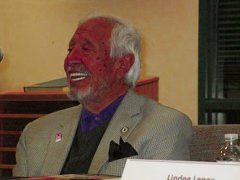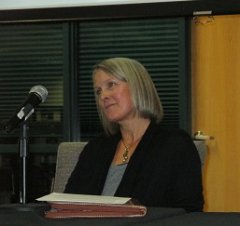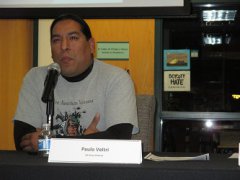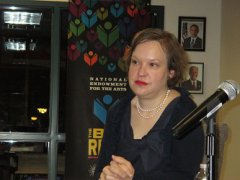Photos and Article by Charlie McKee
"Honoring Our Veterans" Public Forum "Honoring Our Veterans" Public Forum Dr. Felipe de Ortego y Gasca talks about life as "the Mexican kid" in the U.S. Marine Corps. http://www.grantcountybeat.com/images/2014newsitems/3FrontPage/Honoring_Veterans/Ortego.jpg "Honoring Our Veterans" Public Forum Lindee Lennox, U.S. Army military police veteran, explains that her service allowed her to obtain an education and advance in society. http://www.grantcountybeat.com/images/2014newsitems/3FrontPage/Honoring_Veterans/Lenox.jpg "Honoring Our Veterans" Public Forum Paulo Veltri, U.S. Army veteran and medic, tells the audience that "it's all about the guy next to you" in the service. http://www.grantcountybeat.com/images/2014newsitems/3FrontPage/Honoring_Veterans/Veltri.jpg "Honoring Our Veterans" Public Forum Elena Perez Lizano describes the heroic contributions of World War II Code Talker and former Grant County resident, Luis Armijo. http://www.grantcountybeat.com/images/2014newsitems/3FrontPage/Honoring_Veterans/Lizano.jpg
The topic of the November Public Forum hosted by Western New Mexico University (WNMU) Miller Library, the Grant County Democratic Party, the Native American Club, and ASWNMU on Thursday, Nov. 20, was "Honoring Our Veterans."
Gabby Begay, President of the WNMU Student Body, introduced the panel and moderated the evening's session. Begay asked the panelists to talk about their experiences as veterans for 10 minutes each and then opened the session to questions for the panelists from members of the audience.
The panel consisted of three veterans from three different eras of military conflict: 1) Dr. Felipe de Ortego y Gasca, United States Marine Corps World War II veteran; 2) Lindee Lenox, United States Army Vietnam veteran; and 3) Paulo Veltri, United States Army veteran during the Bosnian conflict. In addition to the three veterans, the panel included archivist Elena Perez Lizano, who created the Tribute to Luis Armijo, a World War II Code Talker and Santa Clara resident, which is currently housed at the WNMU Miller Library.
Each panelist shared his or her experiences with the audience, summarized in the following:
• Ortego – As a Mexican American born in Chicago 88 years ago, Ortego had completed only one year of high school by age 17. He then enlisted in the Marine Corps in 1943 and served in the American, Pacific, and China Campaigns of World War II until 1946. Ortego stated that it was the Department of Veteran Affairs (VA) that allowed him to enroll at the University of Pittsburgh with only one year of high school, which subsequently led to his graduating from the University and ultimately obtaining a PhD in English. Ortego credited the Marine Corps with instilling him with discipline and with having "shaped the form of my life."
• Lenox – Lenox stated that she grew up in upstate New York as one of nine children in a blue-collar family and with no hope of achieving a higher education. She moved to Florida in 1974, where a "handsome young U.S. Army recruiter" talked her into joining the Army to become a military police officer. Lenox said that it was a way "to learn, to have a place to live and be fed, and to have the opportunity to go to college." While she experienced discrimination in testing to enter the military, having to attain higher test scores than men in order to qualify, Lenox passed the tests and served two years. After her service, her status as a veteran enabled Lenox to obtain a Civil Service job without competition and to realize her dream of attending college. She told the audience that "the military gave me the ability to advance in society."
• Veltri – As a local Grant County boy, Veltri signed up for the National Guard at age 17 in 1992. However, after two years' service in the Reserves, his attitude changed; and Veltri decided that, as a Native American, he wanted to serve his people in the tradition of becoming a "warrior" in many senses of the word. Veltri enlisted in the U.S. Army with the intention of serving as a combat medic. While he did not see combat, he served as a "mechanized medic" at Ft. Benning and in Vicenzo, Italy. Veltri stated that he took every training that became available to him and was promoted through the ranks. He told the audience that he "would not trade his time in the service for anything" and found the lack of organization and discipline in civilian hospitals and other entities extremely frustrating compared to his experience in the military.
• Lizano – Archivist Lizano gave a presentation on the highlights of Luis Armijo's contribution as a veteran and Code Talker in World War II. She noted that he was half Apache and half Hispanic and spoke English, Spanish, Navajo, and Apache. The Code Talkers used Navajo, Apache, and other Native American languages as code in telegraph communications during World War II to deceive the enemy forces. The U.S. government did not allow the Code Talkers to reveal anything about their activity during the war until 23 years after the end of World War II. Lizano explained that Armijo returned to Grant County after the war, attended and graduated from WNMU, worked in the Chino mine, and went on to teach school in Fullerton, CA. He was honored in and became well known as a result of being featured in Tom Brokaw's book, "The Greatest Generation."
After the panelists spoke, Begay opened the forum to questions from the audience. In addition to asking questions, several audience members shared personal veteran experiences themselves. The audience's questions are summarized as follows:
1) Should military service be required in the U.S. or left as voluntary?
The three veterans on the panel agreed that a two-year service commitment for everyone would be a great benefit to the country, as it is currently in numerous other countries who have such programs in place. Veltri noted that he believes the current generation is lacking structure and discipline and that such a program would help provide those. Lenox agreed that it would be very beneficial, particularly if the opportunity to obtain higher education were part of such a program.
2) What is the panel's view of medical care through the VA?
Lenox, who worked for the VA for 10 years, stated that the recent adverse publicity about the VA's treatment of veterans seeking medical treatment was a case of only a few facilities that had performed badly. She reported that she had personally visited numerous VA medical facilities in the course of her work experience and received consistent positive feedback from the veterans being treated there. Lenox emphasized that there are hundreds of VA facilities that are doing a "stellar job." Audience members echoed Lenox's opinion, reporting personal experiences of being treated better in VA medical facilities than in civilian ones.
3) Are veterans' issues heard and well represented in the government?
Lenox stated that veterans have a very strong voice in Washington, D.C. and are very well represented. Ortego also noted that the American GI Forum is an excellent organization for representing issues concerning Mexican-American veterans.
After the question and answer period, the Forum was adjourned to dinner.



